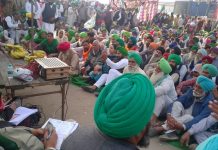In the wake of the ongoing protests against India’s newly amended Citizenship Act, the Lieutenant governor of Delhi has passed an order authorising the police to place the city of Delhi under the National Security Act(NSA)for the upcoming three months.
This is a contentious Act because it is known to provide the police with unprecedented powers over the citizens. The Act allows the police to be able to detain a person for months if it feels that he/she may be a threat to national security. The individual who is arrested through the NIA does not also necessarily have to be informed about the charges that have been imposed on him/her for ten days. The Union Home Ministry has down played the situation and we are told by the government that this is only a routine affair and that it is renewed from time to time.
The notification reads, “In exercise of the powers conferred by sub-section(3) of section 3, read with clause(c)of Section 2 of the National Security Act,1980, the Lt Governor pleased to direct that during the period January 19-April 18, the Delhi Police Commissioner may also exercise the powers of detaining authority under sub-section(2) of the section 3 of the aforesaid Act.”
It was in the month of August last year that the NSA was extended in the erstwhile state of Jammu and Kashmir in the days following the abrogation of Article 370 and the bifurcation of the erstwhile state into two union territories, giving the armed forces in the Valley the right to detain a person on grounds of threat to national security.
The order of putting Delhi under the notorious Act was issued on January 13,2020. This Act would allow a person to be detained without a charge for unto 12 months. The individual also need not be informed about the charges against him/her for ten days. The individual who is detained can appeal before a high court advisory board but is not allowed a lawyer during his trial. If authorities are satisfied, the detained person can be put under preventive detention for months, this only requires the authorities to be convinced that the individual can be a threat to national security and integrity. The state government concerned needs to be intimated that an individual has ben detained under the NSA.
The order of implementing the NSA in Delhi comes during a time when the whole of India and Delhi in particular is witnessing a large number of protest demonstrations against the new citizenship law. The Delhi Police has however gone ahead and said that this is only a routine event and has nothing much to do with the protests and asserted that there wasn’t anything new in it. A similar order had been issued in the state of Andhra Pradesh on January 14.
Why is the NSA critiqued?
In the normal course, when a person is arrested, he/she is not deprived of the certain basic rights. Such rights include being informed about the grounds on which he/she has been arrested. Moreover, Section 5o of the Criminal Procedure Code indicates and mandates that the arrested person has to be informed about the grounds on which they have been arrested and have to be given the right to bail. Other important rights of the detained person under normal circumstances also include, that the person will be produced before the court within 24 hours of arrest and the arrested person cannot be denied the right to consult and be defended by a legal practitioner of his choice. None of these rights are available to the person who has been detained under the NSA. The person who has been arrested under the NSA can be kept in the dark about the reason for his/her arrest and may not be told about their fault for nearly ten days. Even when the government reveals to the detained person why they have been arrested, it can withhold information which it considers to be against public interest to disclose. The arrested person is also not entitled to the aid of any lawyer in any matter connected with the proceedings before an advisory board which is again constituted by the government for dealing with NSA cases.
Cases that have fallen in the ambit of the NSA
The National Crime Records Bureau(NCRB) is known to be a body that is responsible for collecting and analysing data related to crime in the nation. This data does not include information on cases under the NSA as no FIRs are registered in this regard. Thus, it is impossible to have any clue about the exact number of detentions that may have been made under this Act.
We know that it was in January 2019, that the BJP led government in the state of Uttar Pradesh had arrested three people under the NSA in relation to a cow-slaughter incident that has taken place in the city of Bulandshahr. Another occasion when an arrest was made in recent years under the NSA is that of Manipuri journalism Kishore Chandra Wangkhem, who had posted an allegedly offensive Facebook post about the chief minister. Kishore Chandra faced detention under the NSA for one year.














